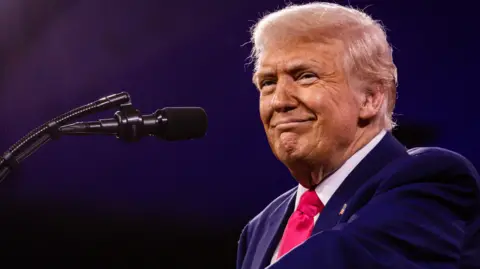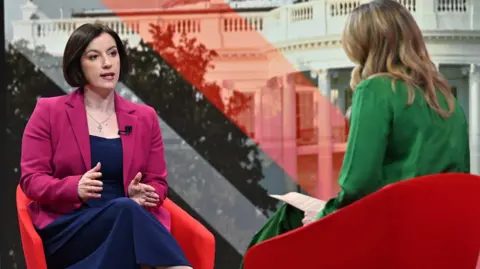Trump right to engage Putin on peace talks, says minister
 EPA
EPAUS President Donald Trump was right to re-establish links with Russian leader Vladimir Putin to set up peace talks to end the war in Ukraine, a senior Labour minister has said.
Education Secretary Bridget Phillipson said there could be "no negotiated peace without Russia" and that Trump's approach had brought "Russians to the table".
The US president has faced a backlash for excluding Ukraine from talks after his aides met Russian officials in Saudi Arabia. Trump has also suggested Ukraine may be a bystander, saying it has "no cards" in the deal.
Prime Minister Sir Keir Starmer will meet Trump in Washington this week and press for Ukraine to be "at the heart" of any peace talks.
Speaking on Sunday with Laura Kuenssberg, Phillipson said that Trump thawing diplomatic ties with Russia and Putin was "the right approach".
"President Trump has brought the Russians to the table," she added.
When asked by Kuenssberg if welcoming Putin back was the right move, Phillipson said, "absolutely".
"There can be no settlement, no negotiated peace, without Russia," she said.
She added "any lasting settlement where it comes to peace does require Ukrainian voices, President Zelensky's voice to be a central part of that.
"There can be no settlement unless we have a negotiation involving both Russia and Ukraine.
"We are however, also clear of the risk that Russian President Putin poses to our interest."
Shortly after coming to office, Trump held a phone call with Putin in which the leaders agreed to begin negotiations to end the war in Ukraine. It was the first phone-call to Putin by a US president since Russia invaded Ukraine in February 2022.
It was a significant thawing of the US relationship with Russia. Trump's predecessor Joe Biden previously called Putin a "murderous dictator" and a "pure thug".
Since the call Trump has claimed Putin wants to reach a deal to end the war in Ukraine - arguing Russia did not necessarily have to negotiate a ceasefire, because it could take "the whole country" by force.
Trump has instead turned on Zelensky in recent days, calling him a "dictator without elections," claiming he was doing a "terrible job" and falsely suggesting he was the one who started the war with Russia.
Trump's short-term goal is to stop the fighting in Ukraine. Longer term, he appears to want less US involvement, given that the country has sent tens of billions of dollars' worth of weapons to Kyiv.
The White House is pushing Ukraine to sign a $500bn (£395bn) minerals deal, which would give the US control over half of Ukraine's mineral resources - which the Trump administration describes this as "payback" for earlier US military assistance.
The Ukrainian president had rejected the initial US proposal made several days ago, saying he "cannot sell our state".
In a video address late on Friday, Zelensky said Ukrainian and US teams were working on a draft agreement, which "can add value to our relations". But he stressed that "what matters most is getting the details right".

Sir Keir is seeking to balance support for Ukraine with keeping his working relationship with Trump.
This weekend, Sir Keir assured Zelensky of the UK's "ironclad support" for Kyiv. The comments came in the second telephone conversation in four days between the two leaders.
It comes ahead of a big week of diplomacy, as Sir Keir heads to the White House on Thursday shortly after French President Emmanuel Macron visits Washington on Monday.
While making his pitch to Trump this week, Sir Keir is expected to set out a path for the UK to increase spending from 2.3% of GDP to 2.5% by 2030 - in line with Labour's election manifesto commitment.
European countries raising defence spending and becoming less reliant on the US for has been a key demand from Trump.
In his push for Nato allies to shoulder more of the security burden, Trump has suggested European nations to commit at least 5% of GDP to defence.
In a speech to the Scottish Labour Conference in Glasgow on Sunday, Sir Keir said "the US is right" that "we Europeans - including the United Kingdom - have to do more for our defence and security".
The UK also must stand "ready to play our role if a force is required in Ukraine once a peace agreement is reached", he said.
Shadow defence secretary James Cartlidge has called on the government to "go further and faster" on increasing defence spending.
Earlier this week, the Liberal Democrats said there should be a national conversation on how to get to a target of 3% of GDP spent on defence.
But Cartlidge refused to say how much the Tories would invest until they see the details of this year's strategic defence review.
Speaking to the BBC's Sunday with Laura Kuenssberg, Cartlidge said the UK was going to have to "invest much more in hard power" and boost spending on "the military".
The Conservatives have argued welfare budgets and foreign aid could be cut to pay for increases in defence.
Cartlidge said his party backed Labour's efforts to ensure Ukraine is involved in any peace talks to ensure lasting peace.
"Because if Russia is seen to in any way 'win' from any settlement, should there be one, I think that would send a terrible signal to other adversaries like China," he said.
His comments were echoed by former Conservative leader and foreign secretary Lord William Hague said he was "very worried" about Trump's approach.
Lord Hague, who is now Chancellor of Oxford University, said: "The only way to end this war in a way that does not encourage future wars is to give as much support as we possibly can to Ukraine – to show Putin that a war of aggression will never succeed.
"Then there is the great danger that in ending this war they would be creating the scene for a wider war in the future, so I think there could be a historic mistake being made here from Washington."

Sign up for our Politics Essential newsletter to read top political analysis, gain insight from across the UK and stay up to speed with the big moments. It'll be delivered straight to your inbox every weekday.
